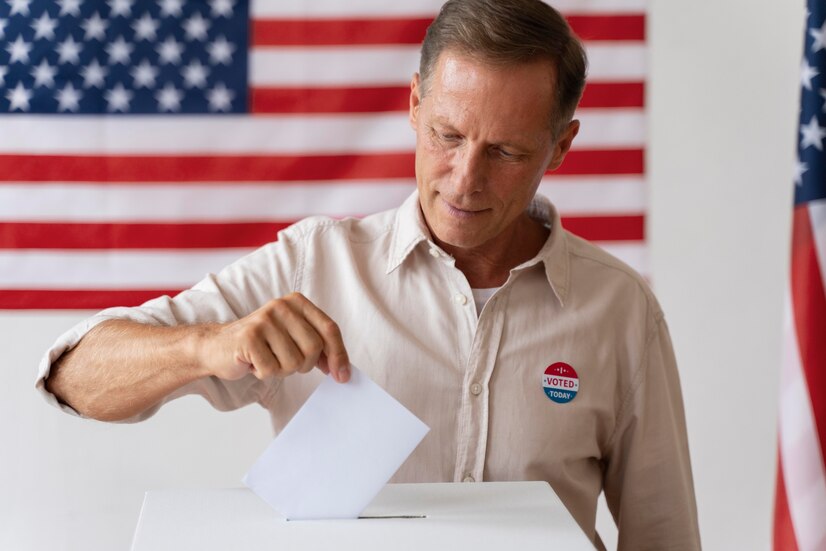The political landscape of the United States is ever-changing, with battleground states playing a pivotal role in determining the outcome of elections. Recent trends indicate that the Republican Party is making significant strides in voter registration in key battleground states such as Pennsylvania, Nevada, and North Carolina. This shift is noteworthy, as it signals potential changes in the electoral dynamics that could impact future elections.

The Importance of Voter Registration
Voter registration is a critical component of the electoral process. It not only reflects the political engagement of the electorate but also serves as a barometer for party strength and support within various regions. In battleground states, where the margin of victory can be razor-thin, shifts in voter registration numbers can be particularly consequential.
Pennsylvania: A Keystone State in Flux
Pennsylvania, often referred to as a keystone state due to its crucial role in national elections, has seen notable changes in voter registration trends. Historically, Pennsylvania has been a swing state, with voters oscillating between Democratic and Republican candidates. In recent years, the Republican Party has been chipping away at the Democrats’ lead in registered voters.
Several factors contribute to this trend. First, the state’s rural areas, which traditionally lean Republican, have seen increased voter registration efforts. These areas, often feeling neglected by national political discourse, have responded positively to targeted outreach by the GOP. Additionally, economic concerns, particularly in regions affected by deindustrialization, have driven many voters towards the Republican Party, which has promised job creation and economic revitalization.
Moreover, the Republican Party has capitalized on issues such as Second Amendment rights and opposition to stringent environmental regulations, which resonate with many Pennsylvania voters. The Democrats’ perceived focus on urban-centric policies has further alienated some rural and suburban voters, contributing to the GOP’s gains in voter registration.
Nevada: A Desert Battleground
Nevada, another critical battleground state, has also witnessed a shift in voter registration dynamics. Traditionally a Democratic stronghold, particularly in urban areas like Las Vegas and Reno, Nevada has seen a concerted effort by Republicans to make inroads with the electorate.
One key factor in Nevada’s changing political landscape is the state’s diverse demographic makeup. The Republican Party has made significant efforts to engage with Latino voters, who constitute a substantial portion of the population. Through community outreach, bilingual campaigning, and addressing issues pertinent to Latino communities, the GOP has managed to gain support in areas that were previously Democratic bastions.
Economic issues also play a significant role in Nevada’s voter registration trends. The state, heavily reliant on tourism and hospitality, was hit hard by the economic downturn caused by the COVID-19 pandemic. Republicans have focused on economic recovery, small business support, and job creation, resonating with voters concerned about their livelihoods and economic stability.
Additionally, the Republicans’ stance on law and order, particularly in response to rising crime rates in urban areas, has attracted voters who prioritize safety and security. By addressing these concerns, the GOP has managed to cut into the Democrats’ voter registration advantage in Nevada.
North Carolina: A Southern Bellwether
North Carolina is another battleground state where Republicans are gaining ground in voter registration. The state has a history of close elections, with both parties vying for dominance in recent years. The GOP’s success in increasing voter registration can be attributed to several strategic initiatives and broader sociopolitical trends.
One significant factor is the Republicans’ focus on suburban and rural areas. North Carolina’s suburban regions, experiencing rapid growth and demographic changes, have become key targets for GOP outreach. By addressing local issues, such as education, infrastructure, and property taxes, Republicans have managed to attract new voters in these areas.
Additionally, the Republican Party’s emphasis on traditional values and conservative social policies has resonated with many North Carolina voters. Issues such as opposition to abortion, support for religious freedoms, and advocacy for family values have helped the GOP connect with voters who prioritize these concerns.
Economic policies have also played a crucial role in the Republicans’ voter registration gains. North Carolina’s economy, with a strong emphasis on manufacturing, agriculture, and technology, has benefited from GOP policies promoting business-friendly environments and job growth. By aligning their messaging with the economic priorities of North Carolina residents, Republicans have successfully increased their voter registration numbers.
ALSO READ
Why Republicans Are Having Better Advantage in These Areas
Several underlying reasons contribute to the Republicans’ advantage in voter registration in these key battleground states:
- Targeted Outreach and Engagement:
- The Republican Party has implemented targeted outreach strategies to connect with specific demographics and communities. By understanding the unique concerns and priorities of voters in rural, suburban, and diverse urban areas, the GOP has tailored its messaging to resonate with these groups. This strategic approach has paid off in increased voter registration.
- Focus on Economic Issues:
- Economic concerns remain a top priority for many voters. Republicans have effectively addressed these concerns by advocating for policies that promote job creation, economic growth, and business-friendly environments. By positioning themselves as the party of economic recovery and stability, the GOP has attracted voters who prioritize financial security.
- Emphasis on Traditional Values:
- The Republican Party’s emphasis on traditional values and conservative social policies has resonated with many voters, particularly in rural and suburban areas. Issues such as religious freedom, opposition to abortion, and support for family values have helped the GOP connect with voters who prioritize these concerns.
- Law and Order Messaging:
- In response to rising crime rates and concerns about public safety, the Republicans’ law and order messaging has gained traction. By advocating for stronger law enforcement and policies aimed at reducing crime, the GOP has attracted voters who prioritize safety and security.
- Engagement with Diverse Communities:
- Recognizing the importance of diverse communities, the Republican Party has made efforts to engage with Latino, African American, and other minority groups. Through community outreach, bilingual campaigning, and addressing specific issues relevant to these communities, the GOP has managed to broaden its appeal and increase voter registration among these demographics.
- Strategic Use of Technology and Data:
- The GOP has leveraged technology and data analytics to identify and engage potential voters. By utilizing voter data, social media, and digital platforms, Republicans have been able to run more efficient and targeted voter registration campaigns, reaching voters where they are most active.
- Response to Democratic Policies:
- In some instances, the Republican gains in voter registration can be attributed to voter dissatisfaction with Democratic policies. Concerns about urban-centric policies, perceived overreach in environmental regulations, and other issues have driven some voters towards the GOP.
Conclusion
The recent gains in voter registration by the Republican Party in key battleground states like Pennsylvania, Nevada, and North Carolina signal a significant shift in the political landscape. Through targeted outreach, a focus on economic and social issues, and strategic engagement with diverse communities, the GOP has successfully cut into the Democrats’ voter registration advantage.
As these trends continue to evolve, the importance of voter registration as a barometer for electoral success cannot be overstated. Both parties will need to continue adapting their strategies and addressing the concerns of the electorate to maintain and grow their support base. The battleground states will remain critical in shaping the outcome of future elections, with voter registration playing a pivotal role in determining the balance of power.






